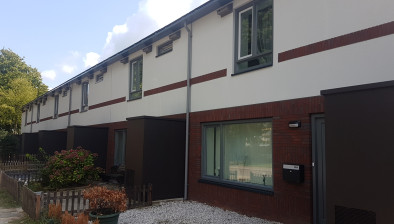Spring Statement: Contractors welcome VAT relief on energy saving measures
The Chancellor’s decision to slash VAT to 0% on home energy saving measures has been broadly welcomed by contractors and trade bodies, though calls remain for the UK Government to support and incentivise people in undertaking retrofitting and other projects through further public support and investment.

In his Spring Statement yesterday, Rishi Sunak said he will reduce the VAT rate on energy saving measures (ESM) and their installation to zero for homeowners.
The University of Strathclyde’s Centre for Energy (CEP) policy’s director, Professor Karen Turner said: “The extension of VAT relief to home insulation materials/costs is a welcome step in reducing the up-front or financed costs of energy efficiency projects in all types of homes. However, in his full budget in the Autumn, we hope that the Chancellor will revisit the challenge of supporting and incentivising people in actually undertaking retrofitting and other projects through further public support and investment.
“Moreover, to build the confidence and business plans that will allow supply chains and new regional and national industry to build up around delivering the scale of energy efficiency improvements we need in our housing stock, we would urge him to announce long term commitment to what is required to move most UK households to EPC C or above.”
The Federation of Master Builders (FMB) said the move will help boost the drive for greener and more energy efficient homes.
Brian Berry, chief executive of the FMB, said: “With 29 million homes in the UK, of which many are leaky and energy inefficient, decarbonising our existing housing stock represents an important piece of the net zero puzzle. Historically, consumers have not been properly incentivised to commission green upgrades to their homes. This VAT cut will help householders insulate their home at a time when energy bills are escalating. It will also provide a much-needed boost to local builders operating in the retrofit market. The Government now needs to build on the VAT cut and implement a long term National Retrofit Strategy to provide business certainty.
“The commitment from the Chancellor to improve the UK’s skills system is encouraging, notably the push for greater numbers of employers to train up staff. This is particularly true for construction, a sector that has suffered long-term skills shortages. Smaller firms in the construction sector already conduct the bulk of the training, with 71% of all construction apprentices being trained by them. Measures should focus on providing long-term solutions that incentivise more businesses to play their part in training the next generation of tradespeople. The FMB therefore welcome the Chancellor’s commitment to enhance this system.”
James Talman, the chief executive of the National Federation of Roofing Contractors (NFRC), said: “I am delighted to see that the government has listened to our calls as an industry to promote the installation of energy efficiency measures by slashing VAT to 0%, on technologies including rooftop solar and roof insulation. It is encouraging to see the government invest in minimising heat loss and creating clean energy to power our homes.
“However, we need to go further to deliver significant emissions reductions and achieve net zero by 2050. Our homes account for 35% of the UK’s energy use and emit 20 per cent of its carbon dioxide emissions. We urge the government to adopt the Construction Leadership Council’s (CLC) National Retrofit Strategy, which offers a comprehensive long-term plan to make our homes greener and get on track to reach net zero.”
He added: “The Chancellor has also promised that his Autumn Budget will include a cut to tax on capital investment by businesses. In order to support UK businesses to invest whilst delivering on net zero targets, we urge him to create a Green Annual Investment Allowance, which would allow investors and building owners to reclaim the tax on any green investment in commercial and industrial buildings, such as improving the energy efficiency of roofs. The longer we take to retrofit our existing building stock, the harder that task becomes—we need to see the Chancellor take leaps towards greener buildings.
“The construction industry along with many others will welcome the Chancellor’s announcement that fuel duty will be cut by five pence per litre, giving businesses help to continue operating amid rampant price increases. Whilst NFRC and the wider industry greatly supports efforts to increasingly power our industry with cleaner energy, we welcome moves to support businesses through this particularly challenging period.”
The National Federation of Builders (NFB) has welcomed the announcement which will help to incentivise homeowners to invest in improving the energy efficiency and performance on their homes.
Richard Beresford, chief executive of the NFB, said: “The NFB, along with many others in the industry, has repeatedly, over many years, called on the Treasury to remove the VAT on measures which improve energy efficiency. To us it always seemed like a ‘no-brainer’ to help incentivise the public to ‘green’ their homes and meet our country’s Net Zero ambitions and today we can finally welcome the decision the Chancellor has taken, it is long overdue but at last it is here.”
CITB’s strategy and policy director Steve Radley said: “The inclusion of insulation in the statement today is of real interest for us and industry. Meeting Net Zero in construction is demand-led and the removal of VAT on energy saving materials is likely to cause a significant increase in the need for low-carbon skills.
“This tax cut will help to create the confidence industry needs to invest in retrofit training.
“The Chancellor said the government will be looking at the issue of employment training in the private sector, which will be reviewed as part of the government’s new tax plan, including assessing whether the Apprenticeship Levy is “doing enough”.
“CITB will continue to work with the government on apprenticeship levy reform as apprenticeships are the main route for employers in our industry to get the skilled workforce they need in recovery. Apprenticeship starts are recovering but it’s vital that we continue to drive numbers up. Critical to this will be building on recent reforms of the Apprenticeship Levy Pledge Service to ensure unspent levy funds from larger companies can be accessed by small employers to provide more apprenticeships.”
Chris Gardner, co-founder of the development lender Atelier, added: “With the cost of building materials surging once again, the Chancellor’s surprise tax cut on energy-saving technology offers a welcome safety valve – both to the construction industry and to homeowners looking to save money on their energy bills.
“The scrapping of VAT on vital, but still comparatively expensive, tech like solar panels and heat source pumps is a logical and popular response to the spike in energy prices that kicks in next week. But it will also offer long-term benefits to homeowners, the environment and UK energy policy.
“Every home fitted with solar panels can be one less home drawing power from Britain’s energy grid, and every home heated by an air source pump means one less boiler burning imported gas.
“While thousands of homeowners and housebuilders would fit energy-saving technology if they could, cost remains a major hurdle. The ‘green premium’ – the difference in cost between using the most energy-efficient versus conventional materials – is slowly reducing as the new technology is produced in higher quantities.
“But with building materials costs rising across the board, today’s 5% cut in the cost of energy saving technology suddenly makes it more affordable, and we look forward to running the numbers with our developer partners who want to go green.
“There’s no doubt that the market appetite for this technology is there, but developers and homeowners just need a nudge to embrace it fully, whether that’s from Government or from initiatives like Atelier’s Carbonlite Challenge, which offers significantly discounted finance to developers who use sustainable, low carbon designs.”
RICS’ Bradley Tully, senior public affairs officer, said: “Our findings from the market suggest that the biggest barrier to improve the energy efficiency of homes is cost – 85% of respondents in fact.
“However, the road to achieving Net Zero always required the retrofitting of thousands of existing homes across this country to make them greener, and discounts for homeowners looking to support these ambitions have been a long time coming, so we’re delighted the Chancellor has finally listened to our call and taken action to cut VAT for families to retrofit their homes and drive down carbon emissions.
“Looking at the wider economic picture – including rising inflation – this poses a significant pressure for businesses, and while the business rate cut being maintained will help our highstreets, it does fall short from the widescale reform that they need to flourish.”
“Rising inflation means difficult times ahead for all businesses.”
Mike Foster, CEO of the Energy and Utilities Alliance (EUA), added: “The Chancellor has clearly not heard the outcry over rocketing energy bills faced by millions. He has done nothing in the Spring Statement to help the vast majority of consumers who face bills doubling this year.
“His VAT cut on solar panels and heat pumps will be welcomed by those who make them and by those who can afford to fit them, but a VAT cut on energy bills would have helped everyone.
“Frankly, consumers waiting to hear good news on their energy bills will be left asking, ‘is that it Chancellor?’”




















